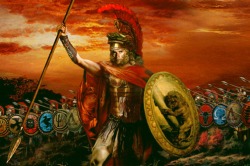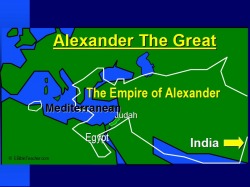Instructor's Notes
"Be kind, for everyone you meet is fighting a hard battle". --Plato
"If you already know everything, then why are you here"? --Me :)
Homework is due each class period. Please make sure that your homework is neat; typing is preferable. You can review the homework guidelines by clicking on the "syllabus" link.
For MLA format details, please visit: http://owl.english.purdue.edu/owl/resource/557/01/
Website for Grammar Review, including Comma Usage: http://grammar.ccc.commnet.edu/grammar/commas.htm
LINK TO "DANTE'S INFERNO": http://www.4degreez.com/misc/dante-inferno-information.html
NOTES ON LITERARY PERIODS & Alexander The Great are below... scroll down...
English 2332 Notes
Notes: Literary Periods:
2 Literary Traditions: Eastern and Western
1. Greek and Roman Period: Western Literary Tradition begins with Homer’s “The Odyssey” and “The Iliad”. The Greek writers set the tone for the format of literature and the themes of literature. The great writers of the period were: Homer, Aeshylus, Aristophanes, Euripides, Sophocles, Sappho, and the Philosophers, Plato and Aristotle.
2. Old English Period: Lasts from invasion of England by the Angles, Saxons, and Jutes in 428 to the conquest by Norman the Conqueror (French). Christianity was being introduced and interwoven with Pagan culture. It was marked by struggles with invading tribes and by a flourishing of learning, but only in the monasteries. Before the monks started writing in “Old English”, writing was in Latin. This was the beginning point of “Genesis” and “Exodus” being introduced (slowly). The best surviving works are Boethius’ “Consolation of Philosophy” and the epic, “Beowulf”.
3. Medieval Period: Middle English becomes the language of the court. Definitely modern English writings appear between 1350-1500. The major contribution was the poetry of Chaucer (“The Canterbury Tales”). Christian tradition crept into the LIT in the form of “Mystery Plays”. Romances were also popular, stories of Knights and Kings, like “Le Morte D’Arthur” and “Sir Gawain and the Green Knight”.
4. The Renaissance: Means “rebirth”. It is a transition from the medieval to the modern world. Lasted from 1500-1660, but can refer to the 14th-17th centuries. Age of compromise—finding harmony between the new Christian tradition and classical and pagan cultures. It was an age of “Humanistic” learning. During the Elizabethan era, we saw a shift in literature… and so we get Shakespeare.
Timeline—relevant to Greek Lit:
2500-1500 BC: “Gilgamesh”
1150 BC: Troy is destroyed by the Acheans
1000-300: Old Testament is being written
700: Homer’s “The Iliad” and “The Odyssey” are written.
600: Sappho writes her poetry
431-404: Peloponnesian war between Athens (1st democracy) & Sparta—Sparta wins
399: Trial of Socrates
385: Plato founds his “Academy”
338: United Greeks defeated by Philip II of Macedon
335: Aristotle founds his school
334: Alexander, Philip’s son, conquers the Persian Empire
307: Library is established in Egypt
148: Macedonia becomes a Roman Province
31: Defeat of Antony and Cleopatra
6- Birth of Jesus; 33: Crucifixion
47-48 (14 years after Jesus’ death): Paul’s missionary journeys
75-78 (40 + years after Jesus’ death): Gospels are written
Map on page 104.
Alexander The Great:
*Philip, King of Macedon, was Alexander’s father, and he wanted to take over Greece.
- Weapons: they fought with 15-18ft spikes called Phalanx.
- Most formidable early opponents were the Sacred Band of Thebans (from Thebes and Athens). They were a group of 150 couples (300) soldiers who were also lovers and were willing to fight to the death.
- At this time, Alexander was a teenager and being educated by Aristotle. At 18, he is called to fight the Thebans at the Battle of Charonea; he wins. Alexander feels as though this proves him as the worthy heir.
_- Diodorus is a scribe who would record Alexander’s life from this point on.
- Philip remarries; his 2nd wife is named Cleopatra, and this causes a rift with Alexander and his mother, Olympus, because if Philip would have a 2nd child, then Alexander may be challenged as the heir.
- Philip expresses the desire to conquer Asia… but he is too caught up in his new marriage. They do have a son together, and this causes problems.
- Philip was an ALPHA MALE, but Alexander was effeminate, and this added to the rift. Alexander had a relationship with his life-long companion, Hephastian.
- 336 BC: Conspiracy over Philip’s death… Olympus has Cleopatra’s son killed to ensure Alexander be the heir.
- Alexander goes to the Oracle at Delphi to know if he can win Asia. He is told that he is invincible. His mother says she has a secret, and he thinks it is that he is the son of a god.
- His Asian opponent is the Persian King Dirius. Against all odds, he wins the battle against Dirius but wants to meet him in face to face combat.
- In Persia, Alexander is faced with the challenge of the “Gordian Knot” at the temple of Zeus. Legend says that whoever can untie it shall rule Persia. He cuts it with his sword…
- Dirius has 100K troops to Alexander’s 40K… but Alexander has strategy and wins. When he takes over as ruler, he is respectful.
- Alexander wants to conquer further. His next challenge is TYRE—the naval harbor—but it is inaccessible. However, he is denied access to the temple of Hercules at Tyre and vows to find a way in. He builds a causeway, which is burned, then rebuilt. He has patience, and it pays off.
- He gets a head to head showdown with Dirius at the Battle of Gagamela. Alexander wins with very little lives lost.
- Alexander goes to Babylon and is the richest man in the world. But he acts impulsively there… drunken orgies, etc.
- Dirius’ men take revenge on him… they wound him, and when Alexander’s men find him, they give him water as a gesture of respect. Alexander grieves his body, then takes Bressos, his killer, and ties him to 2 trees and splits him apart. Dirius’ body is displayed in royal state. This shows Alexander’s respect for his opponents.
- At age 29, Alexander takes a wife to produce an heir. He also adhered to Persian traditions (dress, customs, etc.), which offended some of his men. However, he treks forward to India, where the army is mounted on elephants. There he is wounded when an arrow penetrates his lung, and he decides to go back to Greece.
- Hephastian dies due to an unknown illness, and this devastates Alexander. He clung to Hephastian’s side for 2 days after his death, NEVER getting up. He ordered the doctor hanged for not curing Hephastian. Alexander dies 1 year later in Babylon, some say of a broken heart.
- He is the greatest of all leaders. No person has ever accomplished more remarkable feats in battle. His last words were “to the strongest”. His body was hijacked by Ptolmy of Egypt, and to this day, his remains have not been found.
- 40K soldiers, 20K miles, 12 years. He challenges the notions of a traditional warrior, as well as our stereotypes of "manliness".





